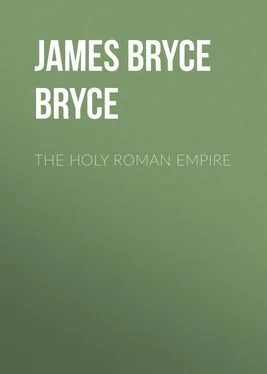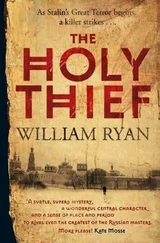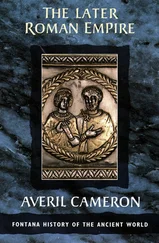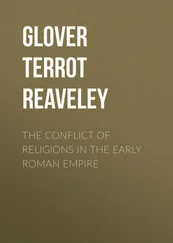James Bryce - The Holy Roman Empire
Здесь есть возможность читать онлайн «James Bryce - The Holy Roman Empire» — ознакомительный отрывок электронной книги совершенно бесплатно, а после прочтения отрывка купить полную версию. В некоторых случаях можно слушать аудио, скачать через торрент в формате fb2 и присутствует краткое содержание. Жанр: foreign_antique, foreign_prose, Историческая проза, на английском языке. Описание произведения, (предисловие) а так же отзывы посетителей доступны на портале библиотеки ЛибКат.
- Название:The Holy Roman Empire
- Автор:
- Жанр:
- Год:неизвестен
- ISBN:нет данных
- Рейтинг книги:4 / 5. Голосов: 1
-
Избранное:Добавить в избранное
- Отзывы:
-
Ваша оценка:
- 80
- 1
- 2
- 3
- 4
- 5
The Holy Roman Empire: краткое содержание, описание и аннотация
Предлагаем к чтению аннотацию, описание, краткое содержание или предисловие (зависит от того, что написал сам автор книги «The Holy Roman Empire»). Если вы не нашли необходимую информацию о книге — напишите в комментариях, мы постараемся отыскать её.
The Holy Roman Empire — читать онлайн ознакомительный отрывок
Ниже представлен текст книги, разбитый по страницам. Система сохранения места последней прочитанной страницы, позволяет с удобством читать онлайн бесплатно книгу «The Holy Roman Empire», без необходимости каждый раз заново искать на чём Вы остановились. Поставьте закладку, и сможете в любой момент перейти на страницу, на которой закончили чтение.
Интервал:
Закладка:
Obliteration of national distinctions.
Emperors who were for the most part natives of the provinces cared little to cherish Italy or conciliate Rome: it was their policy to keep open for every subject a career by whose freedom they had themselves risen to greatness, and to recruit the senate from the most illustrious families in the cities of Gaul, Spain, and Asia. The edict by which Caracalla extended to all natives of the Roman world the rights of Roman citizenship, though prompted by no motives of kindness, proved in the end a boon. Annihilating legal distinctions, it completed the work which trade and literature and toleration to all beliefs but one were already performing, and left, so far as we can tell, only two nations still cherishing a national feeling. The Jew was kept apart by his religion: the Greek boasted his original intellectual superiority. Speculative philosophy lent her aid to this general assimilation. Stoicism, with its doctrine of a universal system of nature, made minor distinctions between man and man seem insignificant: and by its teachers the idea of cosmopolitanism was for the first time proclaimed. Alexandrian Neo-Platonism, uniting the tenets of many schools, first bringing the mysticism of the East into connection with the logical philosophies of Greece, had opened up a new ground of agreement or controversy for the minds of all the world. Yet Rome's commanding position was scarcely shaken. Her actual power was indeed confined within narrow limits.
The Capital.
Rarely were her senate and people permitted to choose the sovereign: more rarely still could they control his policy; neither law nor custom raised them above other subjects, or accorded to them any advantage in the career of civil or military ambition. As in time past Rome had sacrificed domestic freedom that she might be the mistress of others, so now to be universal, she, the conqueror, had descended to the level of the conquered. But the sacrifice had not wanted its reward. From her came the laws and the language that had overspread the world: at her feet the nations laid the offerings of their labour: she was the head of the Empire and of civilization, and in riches, fame, and splendour far outshone as well the cities of that time as the fabled glories of Babylon or Persepolis.
Diocletian and Constantine.
Scarcely had these slowly working influences brought about this unity, when other influences began to threaten it. New foes assailed the frontiers; while the loosening of the structure within was shewn by the long struggles for power which followed the death or deposition of each successive emperor. In the period of anarchy after the fall of Valerian, generals were raised by their armies in every part of the Empire, and ruled great provinces as monarchs apart, owning no allegiance to the possessor of the capital.
The founding of the kingdoms of modern Europe might have been anticipated by two hundred years, had the barbarians been bolder, or had there not arisen in Diocletian a prince active and politic enough to bind up the fragments before they had lost all cohesion, meeting altered conditions by new remedies. By dividing and localizing authority, he confessed that the weaker heart could no longer make its pulsations felt to the body's extremities. He parcelled out the supreme power among four persons, and then sought to give it a factitious strength, by surrounding it with an oriental pomp which his earlier predecessors would have scorned. The sovereign's person became more sacred, and was removed further from the subject by the interposition of a host of officials. The prerogative of Rome was menaced by the rivalry of Nicomedia, and the nearer greatness of Milan. Constantine trod in the same path, extending the system of titles and functionaries, separating the civil from the military, placing counts and dukes along the frontiers and in the cities, making the household larger, its etiquette stricter, its offices more important, though to a Roman eye degraded by their attachment to the monarch's person. The crown became, for the first time, the fountain of honour. These changes brought little good. Heavier taxation depressed the aristocracy 2 2 According to the vicious financial system that prevailed, the curiales in each city were required to collect the taxes, and when there was a deficit, to supply it from their own property.
: population decreased, agriculture withered, serfdom spread: it was found more difficult to raise native troops and to pay any troops whatever. The removal of the seat of power to Byzantium, if it prolonged the life of a part of the Empire, shook it as a whole, by making the separation of East and West inevitable. By it Rome's self-abnegation that she might Romanize the world, was completed; for though the new capital preserved her name, and followed her customs and precedents, yet now the imperial sway ceased to be connected with the city which had created it. Thus did the idea of Roman monarchy become more universal; for, having lost its local centre, it subsisted no longer historically, but, so to speak, naturally, as a part of an order of things which a change in external conditions seemed incapable of disturbing. Henceforth the Empire would be unaffected by the disasters of the city. And though, after the partition of the Empire had been confirmed by Valentinian, and finally settled on the death of Theodosius, the seat of the Western government was removed first to Milan and then to Ravenna, neither event destroyed Rome's prestige, nor the notion of a single imperial nationality common to all her subjects. The Syrian, the Pannonian, the Briton, the Spaniard, still called himself a Roman 3 3 See the eloquent passage of Claudian, In secundum consulatum Stilichonis , 129, sqq. , from which the following lines are taken (150-60): — 'Hæc est in gremio victos quæ sola recepit, Humanumque genus communi nomine fovit, Matris, non dominæ, ritu; civesque vocavit Quos domuit, nexuque pio longinqua revinxit. Hujus pacificis debemus moribus omnes Quod veluti patriis regionibus utitur hospes: Quod sedem mutare licet: quod cernere Thulen Lusus, et horrendos quondam penetrare recessus: Quod bibimus passim Rhodanum, potamus Oronten, Quod cuncti gens una sumus. Nec terminus unquam Romanæ ditionis erit.'
.
Интервал:
Закладка:
Похожие книги на «The Holy Roman Empire»
Представляем Вашему вниманию похожие книги на «The Holy Roman Empire» списком для выбора. Мы отобрали схожую по названию и смыслу литературу в надежде предоставить читателям больше вариантов отыскать новые, интересные, ещё непрочитанные произведения.
Обсуждение, отзывы о книге «The Holy Roman Empire» и просто собственные мнения читателей. Оставьте ваши комментарии, напишите, что Вы думаете о произведении, его смысле или главных героях. Укажите что конкретно понравилось, а что нет, и почему Вы так считаете.












